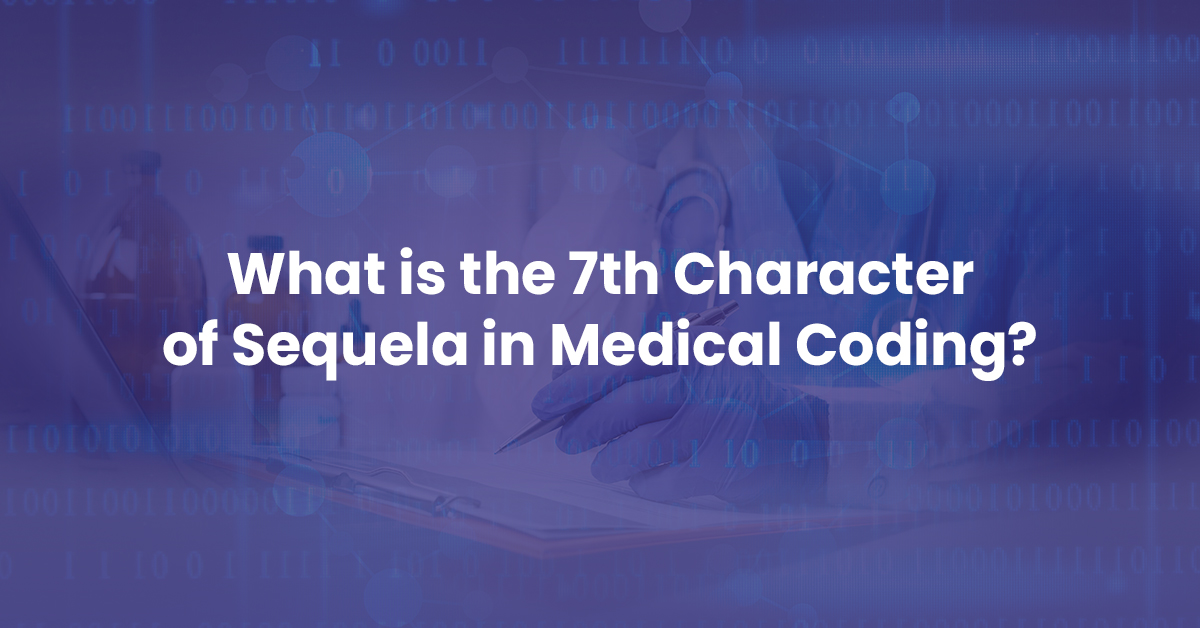In the world of medical coding, there’s a special code used to indicate when a patient is dealing with the after-effects of a previous injury or condition. This code is the 7th character “S” of sequela.
Here’s a detailed breakdown of what “sequela” means and how the 7th character “S” is used:
What is a Sequela?
Imagine you broke your arm a few months ago. The break itself has healed, but you still experience some pain, unease, or stiffness in the arm. This lingering pain or condition is a sequela.
👉 It’s a complication or condition (pain) that arises directly from the original injury (the broken arm) and persists even after the initial healing process.
Sequela can take many forms:
➡ Scarring: This is a common sequela after burns or surgeries.
➡ Chronic pain: Pain that continues long after the initial injury has healed.
➡ Joint stiffness: Injuries to joints can leave them feeling stiff or limited in movement.
➡ Muscle weakness: Damage to muscles can lead to lingering weakness.
How to Use the 7th Character “S” of Sequela?
The key to using the 7th character “S” correctly lies in differentiating between a sequela and an initial complication.
- Sequela (7th character “S”): A late-arising complication that requires treatment after the initial healing process (e.g., treating scars after a burn).
- Initial Complication (7th character “A”): An immediate complication that requires active treatment during the initial healing phase (e.g., endophthalmitis after an injection).
For example:
- A patient suffers a burn of first degree of left hand (coded as T23.102).
- Months later, the patient develops scar contracture – sequela, that requires treatment. The code for this scenario would be T23.102S. The “S” added to the burn code indicates the scar contracture is a late effect – resulting from the initial condition “A”.
The Use of Placeholder X
The placeholder “X” in sequela encounter code is used to place the “S” of Sequela at the 7th number. When a code has 5 or less than 5 characters, the character “X” is added to fill in the empty space/s.
For instance:
The code for fatigue fracture of the vertebra “M48.40” consists of 5 characters. When its aftereffects arise, the “S” of sequela is placed at the 7th character, and the placeholder “X” is added. The sequela code for fatigue fracture of the vertebra is “M48.40XS”.
Using Z Codes Vs. 7th Character “S”
Another important distinction is between sequela “S” and aftercare “Z”. Aftercare codes – Z codes, are used for routine follow-up visits after treatment, not for complications.
Say for example:
If a patient undergoes surgery (coded based on the surgical procedure), a follow-up visit to remove stitches wouldn’t be coded with the 7th character “S”. It would likely be coded with a Z code specific to post-surgical care.
Examples and Codes for the 7th Character of Sequela
Here are some examples of how the 7th character “S” is used with different sequela and their corresponding codes:
| Scenario | Original Condition Code | Sequela Code | Combined Code with 7th Character “S” |
| Fracture of the right wrist (Healed) | S62.91 | Chronic pain in wrist | S62.91XS |
| Burn of first degree of right hand (Healed) | T23.101 | Scarring | T23.101S |
| Contusion of right knee | S80.01 | Pain | S80.01XS |
Benefits of Using the 7th Character “S”
Using the 7th character “S” accurately offers several benefits:
🤝 Clear Communication: It provides a complete picture of the patient’s condition, including any lingering effects from past injuries or illnesses.
🩺 Proper Care: Healthcare providers can understand the root cause of the patient’s current issues and provide the most appropriate treatment.
⚕️ Accurate Billing: It ensures that insurance companies are billed correctly for treating sequela.
Some Additional Examples for 7th Character of Sequela
- Malignancy (Cancer) in remission: While cancer itself might not be coded with the “S”, some late effects of cancer treatment, like fatigue or neuropathy, could be coded with the original cancer code followed by “S”.
- Mental health conditions: Sequelae can also occur in mental health. For example, post-traumatic stress disorder (PTSD) following a traumatic event might be coded with the trauma code and “S”.
💡 Remember
Specific coding guidelines and the choice of original injury code will vary depending on the situation. It’s always best to consult a reliable medical coding company for specific diagnoses.
Our medical coding staff at BellMedEx is certified and trained by the Certified Professional Coder (CPC) certification and adheres to the correct coding guidelines. If accurate coding is taking a toll on your nerves, schedule a free 1:1 medical coding consultation today and outsource your coding tasks at a fair price and 100% accuracy.





